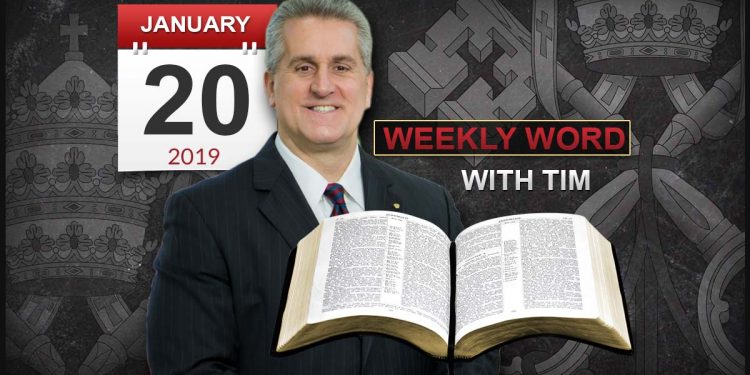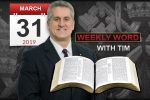3rd Sunday in Ordinary Time ~ Repent and think with the mind of the Church!

Repent and think with the mind of the Church!
Text Below Generated from the audio using AI.
—————————————————————
Hello Apostolic insiders.
Welcome to the Staples household.
It’s been a long time.
And boy, boy, it’s been since last year.
And we’ve had quite a year, haven’t we?
Staples kids, we’ve had some rough times
last year, physically for me, financially.
Let’s just say it’s been a challenge.
“But you know what
I’m excited about this year”
“because there’s good stuff
happening already, right, kids?”
It seemed like we wouldn’t make it.
“Yeah, but Jesus is Lord,
and that is what is most important.”
All right, folks.
But we are in the third or we’re coming up
on the third Sunday in ordinary time.
“And man, it does seem like a long time
since we’ve been together here.”
“But I have to say it again,
the readings are awesome.”
Yes. Yeah, they’re as they always are.
“But I’d like to begin here
with the first reading from Jonah,”
“chapter three, verses
one through five and verse ten.”
And as is going to be really obvious
“from the readings this week,
the theme is repentance, repentance.”
“And you guys remember
the story of Jonah, right?”
Because you’ve seen VeggieTales.
Yeah, but Jonah
“hear, especially in chapter three,
of course,”
“Jonah, the Prophet is called
by God to go to, none of”
which represents like the ultimate evil
“when it comes to the people of God.
Israel.”
“Because, of course, none of
which is the capital of Assyria,”
is the very country that crushed Israel,
imprisoned and enslaved many of them.
They absolutely brutally conquered them.
And yet here we have this message
that God is sending a Jewish prophet
to Nineveh
to preach repentance.
“And you guys remember
Jonah didn’t want to do it right.”
He’s like, what?
“And his message was, In 40 days, Nineveh
will be destroyed unless they repent.”
“So you remember, Jonah says,
I don’t want to go.”
I don’t want to preach repentance.
I want them to be crushed. Right.
“Because there was such deep
prejudice in Jonah’s heart.”
“And of course, Jonah is a symbol,
as it were,”
“of the prejudice
in the people of God’s heart.”
“And God is revealing
and remember guys in the Old Testament,”
“ancient Israel,
even though, you know, Isaiah”
“61, says that Israel was supposed
to be a light to the Gentiles,”
“a light to the nations, now that’s
prophetic in its fullest sense of Jesus,”
“but it also had a literal fulfillment
in the Old Testament.”
“People of God, they were called
to be a light, to bring the truth”
“of the one true God to the world,
but they ended up turning it on themselves”
and really hated the Gentiles, you know.
“And you see that
so profoundly here in in Jonah.”
“And it would really take
Jesus in the coming the New covenant”
to really bring out that truth.
“In fact, this is one of the great
according to Saint Paul, one of the great”
in Ephesians chapter three,
“Saint Paul
says this is one of the great mysteries”
“of the faith,
the fact that Jew and Gentile are called”
as joint heirs to the blessings
of the Messiah who was Jesus Christ
“that was so far away
from the minds of the Jewish people.”
It was a radical revelation, right?
“And so Jonah goes and he preaches
and you guys remember”
the story never repents.
And Jonah is, you know,
he would rather die literally
than to have none of actually repent.
But they did as Jonah.
“But even, you know,
he still wanted them to.”
That’s right.
I mean, he never really got it.
That’s why I remember the vegetarians.
“Jonah was a prophet,
but he never really got it right.”
“I mean, it just goes to show
how deep the prejudice was.”
“But God’s call of repentance
and life is to everyone.”
“You know, guys were going through
something a little bit similar right now”
“because we have a pope in Pope
Francis who is prophetic”
“and he is proclaiming to the world
that all are welcome.”
And you know what?
“When the pope says this, isn’t it
amazing how people get angry?”
But who is it that gets angry?
It’s the righteous.
Yeah, it’s the people of God.
“The ones who should know better
are the ones that get angry about.”
What do you mean?
“All are welcome? Well,
of course all are welcome.”
“But it doesn’t mean that
we don’t have to repent.”
Of course, everyone has to. Has to repent.
“You know, as Pope
Francis, you guys remember we talked about”
“fiduciary supplications
and that new document from the deeds.”
It’s basically Pope Francis
“declaring the truth
concerning the blessing,”
the possible blessing of irregular
or in people in irregular marriages
or even homosexual couples.
“And it’s really quite a beautiful document
because the pope”
“and this is somewhat of a of,
you know, a radical sort of thing,”
“at least to the Catholic culture,
because there’s a lot of, let’s just say,”
prejudice in Catholic culture against,
you know, people in irregular marriages.
And certainly the
LGBTQ, R, s, t, u, V, and all that.
“And, you know, as much as Pope
Francis has been”
“more radical than any pope in history,
declaring the transgender”
ideology, for example, to be demonic.
And he has said, for example,
that in in
Le Tissier, what would that be there?
That was section I want to say 397,
or is it?
No, it was 297 in section 297,
“he said with reference to people
in irregular unions receiving communion.”
I remember we talked about that.
He says it’s possible
in certain exceptional situations. Right.
And we won’t get into all that here.
“Maybe this will be fodder
for a future reflection.”
“But the point I wanted to
make here is Pope Francis makes clear”
“that if these people
are flaunting their sin”
“and that’s a quote from a maurice
Le Tissier 297”
“and we could say the same
about homosexuals”
“or homosexual so-called couples,
and what if they’re flaunting their sin”
“and they’re not sorry
for their sin openly?”
Of course, they can’t be blessed.
“And of course
they could never receive communion.”
“But what Pope Francis is talking about,
both in a maurice Latisha”
“and now in fiduciary supplicants
and elsewhere,”
is the church is open
“to allowing people to receive communion
say that are in irregular unions”
“if they are in exceptional situations
where they are doing something”
that is objectively, gravely sinful,
“but they’re not mortally culpable for it
because they have extenuating”
“mitigating circumstance,
says it’s possible”
“in these exceptional situations
for them to receive communion.”
“You guys remember the explosions
all over the world.”
“You know, we even had cardinals,
a few and bishops who rejected”
“Amoris Laetitia, even though it’s actually
an incredibly beautiful document.”
“I mean, I got to think there is
and I’m not saying this”
“about any in any particular person,
but I think Pope Francis is right”
that we have ideologues in the church
“who are so un
bendable toward these people.”
Right.
“This category of people, man,
we can’t have them.”
These are sinners.
Yeah. You know, and of course it’s true.
“If somebody is practicing mortal sin
and they’re flaunting their saint”
“and so forth,
of course they can’t receive communion.”
And of course they should not be blessed.
But what Pope Francis is talking about
is people who are crying out for help.
“He is saying we need to present the truth
to these people”
and call them to guess what, repentance.
All right.
In fact, in fiduciary supplicant sections
33, 32, and especially there’s section 31,
“he says even to receive a blessing,
a spontaneous blessing,”
“they must acknowledge
that they are sinners.”
“He’s talking about people
who are acknowledging they’re sinners”
and they’re crying out to God for help.
“And he uses the analogy of Peter
in Matthew 14, verse 30”
“When Peter is member,
when he goes walking on the water”
“and in Matthew chapter
14 gets his eyes off of Jesus”
“and he starts to sink into the water
and he says, Lord, save me,”
right?
What does Jesus do?
“Of course, even when he’s in the midst
of the cloud of doubt,”
as Pope Francis says, he saves him. Why?
“Because he calls out for help.
And so that’s what”
“we’re talking about here,
A people that are crying out for help.”
So Jonah preaches the gospel.
“Pope Francis is preaching the gospel
to all groups,”
“even the new divides, man,
that people hate.”
“And isn’t this reminiscent
of our blessed Lord?”
I think about Luke Chapter seven, guys,
where you guys remember the prostitute
“who many believe to be Mary Magdalene,
because it’s after that”
“story of the prostitute who comes into
the Pharisees house, remember?”
And she cries.
She’s weeping at Jesus feet, pours
“expensive oil on his feet,
and her tears are dripping on his feet”
“and he white
she wipes his feet with her hair.”
And of course, Jesus welcomes her.
But who is it that gets angry?
The Pharisees.
All right.
“They say, Well, if he knew what manner
of woman this was, he would not be aware.”
“Of course,
Jesus knows every person on this planet.”
“He knows everything about her,
but he also knows”
that she’s crying out for help.
He knows her intentions are. He knows.
That’s right.
“And in the church,
we always assume the best about people.”
You know, like at the end of mass.
“Look, when father blesses us
and and this is true”
“in fact and finishes supplications,
you know,”
“Pope Francis and and Cardinal Fernandez
who wrote this”
“as the prefect of the CDF, the DeCastro
for the doctrine of the faith.”
“He he references
a prayer from the liturgy.”
“Think about the blessing at the end
of mass or any liturgical function.”
You go to a baptism, a wedding mass.
It doesn’t mean the priest always funeral.
Absolutely.
“The priest always blesses everyone
and he doesn’t pause and say, Now,”
“if anybody in here is harboring mortal sin
and you’re,”
“you know,
you have no sorrow in your heart,”
“this blessing is not
could be effectual for you.”
You need to go to repent, to confession.
Of course, you don’t say that.
You just bless the church blesses.
All right.
“And that’s got to be our mindset
is that we assume the best”
“and we bless everyone, as Pope
Francis says, unless”
“when it comes to these spontaneous
blessings, you know,”
“and that’s that’s really what
fiduciary supplicants,”
“especially sections 33, 32
and more than that”
“but especially there is talking about,
yeah, if you have a situation where”
“you have a homosexual couple
that’s coming flaunting their sin”
“with no intention of changing their lives,
of course you can’t bless them”
“because the church cannot,
does not have the power to bless sense.”
“But if you have a couple
that’s trying to live a chaste life,”
“they’re trying to get out of sin
and they’re like Peter”
“and they’re sinking down
and they call out for help.”
Of course, you can bless them, right?
“And that’s
what Pope Francis is talking about.”
“But I do think, guys, that man,
the reaction”
you get from so many
“just angry
because Pope Francis would dare to allow”
these people to be blessed,
even though Pope Francis makes very clear
“these are people that are acknowledged
saying they are sinners”
“in need of a savior,
as he says there in section 31.”
“Well, this is kind of
what’s going on here in in,”
you know, Jonah, chapter three,
“even the prophet himself,
I don’t want these people to repent.”
I want them to go to hell.
And we really have to check ourselves.
“And I think we have to start thinking
with the mind of the church.”
Right.
As as you know, when Pope Francis issues
“either himself or through the deeds,
a magisterial document,”
“we have to form our minds in accordance
with the teachings”
“of the magisterium of the church
and start to think with the mind of God.”
Jonah never got there, guys.
He never got there, right.
That’s how prejudice he was.
We have to get there.
“But that leads us to the to the Psalm
in Psalm 25.”
“And notice
and in the first section from the Psalms”
verses four and five your ways. Lord.
This is Psalm 25. Your ways.
Lord, make known to me.
Teach me your paths, write
guide me in your
“truth and teach me for
you are God my Savior.”
“Notice three times it’s
teach me your ways.”
Guide me in your truth.
Your your, your not my, my, my.
“We have to change our minds
and allow the Gospel of Jesus Christ”
“to permeate our minds, be renewed in
the spirit of your mind, says Saint Paul.”
“So that we think like Jesus
and think like God,”
“and then all to repent
and all to be saved.”
The Master Church. Amen.
He wants.
All good.
Good point. Luke.
First Timothy, Chapter two, verse four.
God Wills all to be said.
Not all, except those people
“all to be saved
and come to the knowledge of the truth.”
And look at the section,
“the second section here from Psalm 25,
verses six and seven.”
Remember that your compassion
“and your love are from eternity
in your kindness.”
“Remember me
because of you, because of your goodness.”
Lord, good and upright is the Lord.
I’m moving on to verses eight and nine.
“Thus he shows sinners
the way He guides the humble”
to justice and teaches the humble his way.
That’s got to be our hearts cry, folks.
And this leads to first Corinthians
“chapter seven, because I want to emphasize
something here.”
“The last two readings for this week
kind of turn.”
“You know, the first sections
are really talking about repent,”
“like Jonah preaching to the nine invites,
and they repent.”
And remember God said, in 40 days,
“I will destroy Nineveh unless they repent
and they repented.”
“And then God himself says,
I repent of what I thought”
“to do unto them
because they have repented.”
He he did not destroy them.
“Now, of course, this is not, as some will
say, once God changes his mind here.”
“What’s going
on? How can God change his mind?”
That’s anthropomorphic language.
God doesn’t actually, you know, go, boy.
They surprised me.
I didn’t know they were going to do that.
Yeah, in a way we can understand.
That’s right.
That’s anthropomorphic. Fixed language.
That’s good. Luke.
“He’s speaking
in a way that we can understand.”
“And that’s what we mean
by anthropomorphic language.”
You’re right.
“But nevertheless,
it is talking about and emphasizing”
“this idea of repentance
and even emphasizing”
“that initial repentance
that we’re all called to in our lives.”
“But in the last two ratings, we see
more of an emphasis not just on repentance”
but on the on going
“this is important repair,
intense and change of mind.”
“Because remember,
what does repent in Greek?”
“Do you remember
Luke In Greek it’s meant to noia,”
which means to change the mind, right?
“And so repentance
means to change your mind.”
“And it’s not something that happens
ordinarily in just one act,”
“though, you know,
we can have a profound conversion”
“at some points in our lives
and real radical conversion.”
“We need an on going repentance
in our lives, right?”
“That’s
why we go to confession a lot, right?”
Luke Right.
“Rose Because we need to, to you know,
I always put it this way in Acts”
“chapter two, verse four
remember at Pentecost, the Holy Spirit”
“fell on the Apostles and they were filled
with the Spirit, right?”
“Began to speak in tongues
and had that radical conversion.”
Well, two chapters later
“in in chapter four,
I think it’s verse 31,”
it says, And they were gathered together
“and they were filled
with the Holy Spirit again.”
Well, Luke,
“why did they have to be filled again
when they were already filled in”
“chapter two, verse four
Do you remember what we say?”
They leaped
right.
“That’s what we can fill the spirit,
but we leak and we need to get filled”
again and again and again.
And part of that conversion process comes
by renewing our minds, right?
“I say to St Paul’s had to be renewed
in the spirit of your mind,”
“to be transformed
intellectually as well as”
spiritually. Right.
“And this is an example here from the third
or the second reading”
“yet because memory of the first reading
the Psalm and now this is the second”
“reading from first Corinthians seven,
This is a very strange text guys.”
But First Corinthians seven, 20 1931 says,
Let those having wives
act as not having them.
Listen to this.
Rose Those weeping as not weeping,
those rejoicing as not rejoicing,
those buying as not owning,
“those using the world as not using it
fully”
“for the world in its present
form is passing away.”
What in the world is Paul talking about?
“Let those who have wives act
as though they don’t have wives?”
What gives?
Right
“now, this
is the radical language of the prophet.”
“You guys have heard me say Pope
Francis uses often that”
“radical language of the prophet
where he’s he’s he shakes us up.”
Right.
“He’s giving us like Jesus
to go to the periphery to”
“to the to the folks that nobody accepts,
at least in our culture.”
“Right now, evil homosexuals
or the evil transgender people or”
“or those who are married
outside of the church.”
“The pope is calling us
to reach out to them.”
Right.
Not to accept them in their sin? No.
“Where ultimately the goal
is to bring everyone and my goodness,”
“Pope Francis is so clear on that
and fiduciary supplicant that it’s it’s”
“all about bringing people to the fullness
of the gospel of Jesus Christ.”
But you have to go out to them, right?
You can’t just yell at them from afar.
“He’s telling us to reach out to them
the way Jesus did think about how radical”
“Jesus was, letting that prostitute wipe
his feet with her hair and all of that.”
“They were enraged, saying,
that is scandalous.”
Was it scandalous? No.
“The only scandal was in the hearts
of those Pharisees and such.”
“Jesus was reaching out with love
and that woman”
was transformed as a result of that.
Notice in Matthew chapter eight.
“He didn’t just heal the leper,
he touched the leper.”
“Which again, would outright outrage
the Jews. Why?”
“Because you can’t touch a leper
if you do your unclean.”
The law says.
So what did Jesus did?
He touched leper.
How dare you break the law?
Well, guess what?
He is the new Moses who is giving us.
“And in fact, in another place
in the Matthew chapter”
“15, and it’s also
found in Mark chapter seven,”
remember,
“Jesus makes a radical statement
when he says it’s not that”
“which goes into the body
that defiles a man.”
you talk about getting Jewish folk mad
“because what had they been teaching
since the time of Moses?”
“If you eat pork,
you become unclean, right?”
That’s the law. That’s God’s law.
“Who is this
Jesus coming along now and saying”
“it’s not that which goes into the mouth
and into the belly”
“that defiles a man,
but that which comes out of the mouth.”
Ach, Guardian out of the heart.
That’s what defines a man.
“And in Mark’s verse and in Mark
chapter seven, he puts in parentheses.”
Thus he declared all foods clean.
See, he’s revealing.
He’s not just the new Moses, he’s God.
Because that’s saying only God
“can abrogate the laws
of the Old Testament.”
Well, he just did all right.
He says, Guess what?
“Those laws are toast
because I’m the I’m the new Moses.”
“And even more than that,
I am the Lord of the Sabbath.”
As he says in Mark chapter two, verse 28,
the son of man is the Lord of the Sabbath.
“So he’s about to rearrange people’s
understanding of the Sabbath as well,”
“because he’s about to establish
the Lord’s Day on Sunday.”
Remember, we take this stuff for granted.
“This was radical stuff
in the first century.”
What is he saying?
It’s not that which goes in.
But he’s absolutely right.
It’s not.
You know, Jesus is teaching the truth
“about what the law
is, the core, the heart of the law,”
the old Testament had lots of laws
“that were temporary,
and they served a purpose for the time.”
“But he eliminates them
and teaches us the core of the law.”
What is true of the law and what is divine
in the law, and therefore unchangeable.
Okay, that that’s fodder for a whole.
We could do a whole meditation on that.
“But my point is, guys,
when he touches the leper,”
“when he speaks to the woman
in John chapter four, the Samaritan”
“woman at the well,
you don’t talk as a rabbi.”
“You don’t talk to a woman in public, and
you certainly don’t talk to a Samaritan.”
Are you kidding me?
“They’re half breeds,
half Jew and half gentile.”
“And we don’t have dealings
with those people.”
I’ve got two birds with one stone with.
That’s American. Yes, he did.
Yes, he did.
And so, you know, again,
“we’re talking about here
a transformation of the mind”
“we need in order to really appreciate
what’s going on here with Jesus.”
“And I argue now with our Holy Father,
who I think is a prophet, as well as”
the shepherd who
is the image of Luke Chapter 15.
He leaves the 99 to go after the one.
“Unfortunately,
some of the 99 get mad sometimes, right?”
“But the 99 needs to see
the heart of the shepherd”
going after the one in extraordinary ways.
And in fact, that’s the whole message.
But here’s what’s fascinating
is you’ll notice it’s both
“the example of the of the prostitute
that Jesus reaches out to.”
“That is the occasion for the
for the Pharisees and the scribes and”
“and the priest to say
this man is a glutton and a wine pepper,”
“and he’s a friend of tax collectors
and sinners right there.”
“They’re accusing Jesus because he’s
hanging out with these sinners.”
Tax collectors.
Remember, Matthew was an apostle.
He was an evil tax collector.
“Jesus called him to be an apostle
and and on and on.”
We could go both in Luke chapter seven
“and again in Luke, chapter 15,
we see the same thing.”
“And in fact, in Luke 15, now that we’re
going to fast forward from Luke seven,”
“the first two verses, it
says, and the Tax Collectors”
and Sinners were being drawn to him.
Now, why do you think that is?
Luke Because he reached out to them
instead of condemning them all the time.
Guess what?
“They didn’t want anything
to do with Judaism because all they were”
told is they were inferior and get away.
“And the same could be said
for lepers as well.”
Get out of our community.
We don’t want anything to do with you.
Jesus touches them. See?
“Now, in order to be able
to do these sorts of things,”
we need a transformation of our minds.
“And this is what Paul’s talking about
in First Corinthians seven.”
Those having wives act is not having them.
What those weeping is not weeping.
Those rejoicing is not rejoicing.
“Those buying is not owning those using
the world is not using it fully.”
“For the world in its present
form is passing away.”
We need an ongoing conversion
“so that even your mother and I,
who love each other very much,”
we cannot allow our relationship
“to contradict in any way our relationship
with Jesus Christ.”
Right.
So even that which is good and holy,
“we must have a sense of detachment
from and recognize what comes first.”
This is why Jesus would say in Luke 1426,
if any man comes to me and does not hate
father, mother, brother, sister, wife,
“what really
I hate my wife lands and everything else.”
He cannot be my disciple.
“Now, that doesn’t mean literally
that I have to hate my wife.”
“I mean,
Jesus said we have to love our enemies.”
“I think that would at least
include your wife as an enemy.”
Right?
You love your wife.
Say so.
What is he saying?
That again is the language of a prophet.
He is saying you must hate,
“not in the sense of a hatred
where you will a curse on someone,”
but in the sense of nothing
can come before God.
And that’s what Paul’s talking about here.
This is the mind of the repentant man
“who doesn’t allow even things that are
good, even things that you rejoice in.”
Right?
You know, those weeping is not weeping.
Those rejoicing is not rejoicing.
Those buying is not owning. And such.
“This is the result of a man
who is living a life of repentance,”
“which leads us to the final,
and that is the gospel and the gospel.”
This week is Mark chapter one
“verses 14 through 20,
which is a powerful text where Jesus is”
with the apostles in Galilee,
and we read of the repentance.
“So I’m going to focus here
because it talks”
“about the repentance,
both Peter and Andrew and James and John.”
But I want to focus on something here.
The first verse.
“Mark 114
Notice after John had been arrested,”
“Jesus came to Galilee proclaiming
Gospel of God.”
This is the time of fulfillment.
“The Kingdom of God is at hand, repent
and believe the Gospel.”
“And verse 16 says,
As He passed by the Sea of Galilee,”
“he saw Simon and his brother Andrew,
casting their nets into the sea.”
They were fishermen
“and Jesus said to them, Come after me
and I will make you fishers of man.”
“Then they left their nets
and they followed him.”
“Now a lot of folks get the wrong idea
here, Luke, and I want you to follow me”
“on this, that this was the first meeting
of Peter and Andrew.”
The first time they see Jesus.
“Jesus says, Come follow me,
and they give up everything.”
That’s actually not what happened.
“In fact, that’s a popular myth,
but it’s not what happened.”
“In fact, notice here, number one,
it says after John had been arrested,”
“number one and two,
Jesus came to Galloway.”
“Very important, because if you go to
John’s gospel, for example,”
chapter one verse 28, we know that
“Peter and Andrew and James
and John had met”
Jesus before this, in fact,
a significant period of time before this.
And how do we know this?
“Because of that phrase there
after John had been arrested?”
“If you go back to John’s now,
that means not John the Apostle,”
“but John the Baptist
after he had been arrested.”
If you go to John’s gospel, chapter one,
“if you started verse 28
and go all the way down to verse 42,”
you have the story
of Get Again of Peter and Andrew
meeting Jesus.
“And in fact, that’s the first time
they meet Jesus, because it’s Andrew”
“who is a disciple of John
the Baptist who first meets Jesus.”
“He goes home and gets Peter
and brings him back to introduce him”
to Jesus.
“And they don’t leave everything
immediately and follow Jesus.”
They’re with him for a while.
And how do we know that?
Well, first of all, that happened
in Bethany, not in Galilee.
Remember, Bethany is a city in Judea.
It’s not in Galilee.
Right.
So this is before Jesus went to Galilee.
“In fact, he wouldn’t go to Galilee for
for some time.”
“But number two, John
the Baptist was still alive.”
“And we know that because if you read down
all the way to John, chapter three,”
verse 24, the Scripture talks about
“John still being alive, John baptizing
Jesus, meeting”
“John, and Jesus is baptizing,
John is still baptizing.”
“All of this is happening in John one,
John two, John three.”
“You have the wedding feast of Kearny
and Nicodemus.”
That story. And John is still alive.
“He had not just alive,
but he hadn’t been arrested yet.”
It wouldn’t be until I want to say John.
324 that John is finally arrested.
“So this that’s being recorded
happens in Mark’s gospel.”
Are you following me, Luke? Yes. This
here doesn’t happen until John
has been arrested.
“So all that other stuff, Peter and Andrew
meeting Jesus happened before this.”
Now why is that important?
“Because even though and I’m
going to finish with this because I know”
“I’m going to long Hey, I haven’t done this
in a while, so forgive me.”
It’s difficult.
I’m so excited to be back and able
to to do these reflections.
I want to finish on this point.
And that is that even though
there’s no doubt the inspired author here
“and Holy Mother Church
in giving us these beautiful readings”
“this week, want to emphasize
the radical nature of repentance.”
“Luke We are called to give everything
and follow Jesus.”
That is the nature of repentance,
change of mind, change of heart,
giving up everything and following Jesus.
And that we see beautifully
portrayed here in Mark Chapter one verses
14 through 20 in the lives of Peter,
Andrew, James, John giving everything.
“And there’s so much
we could talk about here, what that meant.”
They are leaving their livelihood.
“They’re leaving everything
and they’re going out into the darkness.”
They don’t like Abraham, man.
“I mean, these are the New Testament
patriarchs because they’re going out”
“not knowing what in the world
is going to befall them.”
But they they saw Jesus
and they radically gave up everything but
“we also need to emphasize
that this didn’t just happen one time.”
This was a process.
They had seen Jesus talk to a madam.
Jesus even prophesied in John chapter one
“long before
this happened here in Mark one.”
He says, Your name is is Simon.
You shall be called Kifah.
You shall be called the Rock.
“So Jesus prophesied
about what was going to happen to Peter,”
but Peter hadn’t given yet.
“He’s still he’s looking, he’s going,
my goodness, this guy is wild.”
This is is it? Could this be the Messiah?
“But he came to that point
and then we have to emphasize as well,”
“it didn’t end in Mark chapter one, even
after all that other good stuff happened.”
“And then they go to Galilee
and then Peter does”
“in fact, Peter and Andrew and James
and John leave everything and follow him.”
That’s not the end either, Luke.
But they have to continue to repent.
And so do we, day in and day out.
“It really is a day early conversion
process.”
Yes, we need those special times.
Baptism, confirmation, confession.
“These are all opportunities
for conversion,”
“but we’re called
and I’ll leave you with this.”
“And I think this sums up
everything we’ve been talking about”
“in this reflection,
and that is Luke chapter nine, verse 23.”
Jesus says, Unless a man take up his cross
“daily Luke, not one time,
not one time at a Billy Graham crusade,”
“not one time at Boulevard Baptist Church,
where you accept Jesus as your personal”
“and Savior, not even one time
when you’re baptized, right?”
“We could talk about what’s right
and what’s wrong here,”
but I think you get my drift here.
“Yeah,
but Jesus says we must take up our cross”
daily, allow God to transform our minds
so that we think in his ways, not our ways
“that our minds are renewed
and transformed day to day.”
We allow God to change our hearts.
“And you know what happens,
Luke, Before long, we start thinking”
“like Jesus, and we start thinking
with the mind of the church.”
And when that happens, we are dangerous
individuals to the Kingdom of Satan.
He is petrified.
“He’ll do anything
to keep you from really manifesting”
“the mind of Christ, because that’s
what’s going to change this world.”
God bless you
in going back.




